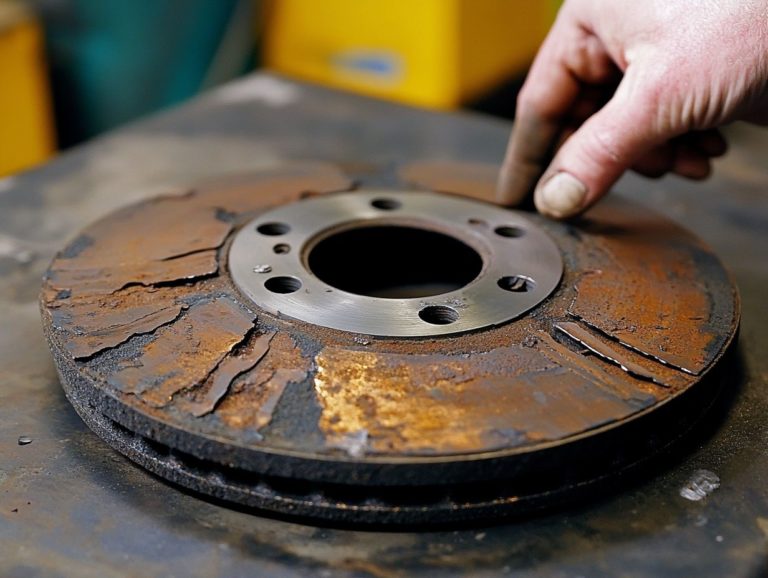How to Keep Your Car’s Battery in Good Shape?
A car battery is truly the unsung hero of your vehicle, powering everything from that satisfying engine start to the essential electronics that keep you connected on the road.
Understanding the various types of batteries, along with their components and functions, is essential for you as a car owner. This article delves into the common causes of battery damage, provides maintenance tips to extend its lifespan, and highlights the signs that may indicate a failing battery.
You ll also discover when it s time to replace your battery and how to select the right one, ensuring your car operates smoothly for years to come.
Let s explore how to keep your car s battery at its best!
Contents
- Key Takeaways:
- Understanding Car Batteries
- Causes of Battery Damage
- Maintaining Your Car’s Battery
- Signs of a Failing Battery
- Replacing Your Car’s Battery
- Tips for Long-Term Battery Health
- Frequently Asked Questions
- 1. How can I prevent my car’s battery from dying too quickly?
- 2. What is the ideal temperature for a car battery?
- 3. Are there any maintenance tasks I should regularly perform on my car’s battery?
- 4. How often should I replace my car’s battery?
- 5. Can I jumpstart my car if the battery dies?
- 6. What should I do if my car battery keeps dying even after regular use?
Key Takeaways:

- Regularly check and maintain your car’s battery to prevent damage and prolong its lifespan.
- Be aware of common factors that can affect battery life, such as extreme temperatures and lack of use.
- When replacing your car’s battery, choose the right type and follow proper installation techniques for optimal performance.
Understanding Car Batteries
Understanding car batteries is essential for every vehicle owner, as they play a pivotal role in starting the engine and powering electrical systems. The most prevalent type of car battery is the 12-volt battery, providing the necessary voltage for ignition and various accessories.
Regular inspections and diligent maintenance are crucial for extending battery life and preventing unexpected breakdowns. Familiarizing yourself with trustworthy brands such as Interstate Batteries, along with reliable breakdown recovery services like Start Rescue, can offer you peace of mind regarding your battery s performance.
Types of Car Batteries
You have several options when it comes to car batteries, including lead-acid, AGM (Absorbent Glass Mat), and lithium-ion batteries. Each brings unique properties and applications to the table.
- Lead-acid batteries: Reliable and cost-effective but have a shorter lifespan and added weight.
- AGM batteries: Great performance and impressive vibration resistance, making them a fitting choice for modern vehicles.
- Lithium-ion batteries: Lightweight and high energy density, but carry a heftier price tag.
Each type of battery has its quirks regarding maintenance. Lead-acid batteries require regular fluid checks to keep them in top shape, while AGM and lithium-ion batteries are more forgiving, demanding less upkeep and enhancing their performance over time.
Components and Functions
A car battery comprises several essential components, including the battery terminals, electrolyte levels, and the internal chemistry that powers your engine and electrical systems. Each of these elements plays a pivotal role in ensuring the battery operates at peak efficiency.
The terminals act as vital connection points for electrical current to flow. The plates crafted from lead or other materials facilitate the necessary chemical reactions that create power in the battery. Maintaining optimal electrolyte levels is crucial because this fluid conducts electricity and supports the electrochemical processes within the battery.
By regularly checking for corrosion at the terminals and ensuring proper acid levels, you can significantly enhance the battery’s health. This attention to detail not only prolongs its lifespan but also ensures that your vehicle performs reliably, even in less-than-ideal conditions.
Causes of Battery Damage
Battery damage can occur for a variety of reasons, significantly impacting both battery life and performance if not addressed promptly.
Factors such as corrosion on battery terminals, low acid levels, and exposure to extreme cold can all have detrimental effects on the battery’s health. Using power-hungry accessories can also drain the battery, resulting in premature damage and potentially costly replacements.
Don t wait! Check your car s battery today and ensure you re always ready to hit the road!
Common Factors that Affect Battery Life

Battery life is influenced by several factors, including environmental conditions, maintenance practices, and battery type. Regular inspections can significantly prolong your battery s lifespan.
Extreme temperatures can hurt performance. Batteries work best in moderate climates but struggle in excessive heat or cold.
Improper charging habits can reduce efficiency and lead to premature failure. Techniques like using a smart charger and avoiding deep discharges will enhance your battery’s health.
Keep an eye on the terminals, ensuring they are clean and secure. By following these simple strategies, you can make your battery more reliable.
Maintaining Your Car’s Battery
Maintaining your car’s battery is vital for ensuring its longevity and reliability. Regular cleaning of battery terminals, using a battery charger, and keeping the battery warm in colder months can prevent freezing and damage. For more detailed advice, check out this guide on how to maintain your car’s electrical system.
Taking these steps helps your battery stay in peak condition, ready for your journeys.
Proper Care and Maintenance Techniques
Implementing proper care and maintenance techniques can significantly enhance your battery’s performance. Start by routinely checking the acid level and using baking soda to prevent corrosion.
Make it a habit to inspect the battery terminals and the liquid inside the battery that helps it work. If the acid level appears low, adding distilled water is essential for restoring balance.
For corroded terminals, a simple mixture of baking soda and water can effectively eliminate buildup that obstructs electrical flow. Consistently following these steps fosters reliable battery performance, leading to smoother operations during your daily drives.
Signs of a Failing Battery
Spotting a failing battery early can save you from unexpected breakdowns and hefty repair bills. Watch for common symptoms like dimming headlights, trouble starting the engine, and fluctuating battery voltage. These indicators suggest that your battery’s life may be dwindling.
Recognizing Symptoms and Taking Action
It s essential to recognize the signs of a failing battery for timely action, whether that means consulting a mechanic or preparing for a replacement.
Symptoms like dimming headlights, slow engine cranking, and unusual electrical behavior should signal the need for immediate attention. If you notice these issues, check the connections for any corrosion and ensure the terminals are clean and securely fastened.
Regular maintenance such as inspecting fluid levels and testing voltage can significantly extend battery lifespan.
If these symptoms persist, seeking guidance from a qualified mechanic is crucial. They can conduct a thorough diagnostic to determine if a replacement is necessary or if other underlying issues need to be addressed.
Replacing Your Car’s Battery

Replacing your car’s battery is a crucial responsibility that every vehicle owner should grasp. It significantly influences your vehicle’s performance and safety. Consider the battery s age, visible signs of wear, and the importance of regular inspections to know when it s time for a replacement.
Using a battery charger can extend the lifespan of your new battery, ensuring you get the most value out of your investment.
When to Replace and How to Choose
Knowing when to replace your car battery is essential for maintaining your vehicle’s reliability. Look for signs like decreased cranking power or the age of the battery; these are clear indicators that it’s time to take action.
Pay attention to any unusual behavior, such as dimming headlights or a sluggish start. These may signal that your battery is on the brink of failure. When shopping for a new battery, consider your vehicle type and driving habits to ensure you choose one that meets specific performance requirements.
Keep your battery healthy with simple maintenance it pays off in the long run! Regular tasks like keeping the terminals clean and checking fluid levels can make a significant difference. Don t hesitate to consult a mechanic; their expertise can help you identify potential issues early and ensure you select the perfect battery for your vehicle’s unique needs.
Tips for Long-Term Battery Health
To ensure the long-term health of your car battery, follow these effective maintenance practices: routinely check the battery voltage, use a trickle charger (a device to keep your battery charged), and apply methods to stop rust. For detailed advice, refer to our guide on how to maintain your car’s electrical system.
These steps not only extend the life of your battery but also enhance your vehicle s overall performance.
Preventive Measures and Best Practices
By adopting preventive measures and best practices for battery maintenance, you can significantly enhance its lifespan and performance. Clean the battery terminals regularly and check acid levels as essential first steps.
Ensure connections are tight and free from rust to maintain optimal conductivity. Implement routine checks, like inspecting the battery for signs of swelling or leakage. These observations can uncover underlying issues before they escalate into more significant problems.
Using a battery tester provides valuable insights into the battery’s health, allowing for timely interventions that can save you from unexpected breakdowns. Don t overlook environmental factors; park your vehicle in shaded areas or garages to shield the battery from extreme temperatures.
With these strategies, you’re investing in a reliable and long-lasting battery, ensuring that your vehicle remains road-worthy for all your adventures.
Frequently Asked Questions
1. How can I prevent my car’s battery from dying too quickly?

The best way to keep your car’s battery in good shape is to regularly drive your vehicle for longer periods. For more tips on maintaining your car’s battery health, remember that battery life often shortens due to frequent short trips, so try to combine errands and avoid unnecessary driving.
2. What is the ideal temperature for a car battery?
The ideal temperature for a car battery is between 50-80 degrees Fahrenheit. Extreme temperatures, whether hot or cold, can cause the battery to age and deteriorate more quickly.
3. Are there any maintenance tasks I should regularly perform on my car’s battery?
Yes, it’s important to regularly clean the battery terminals and ensure they are free of corrosion. Check the battery’s fluid levels and top it off with distilled water if needed.
4. How often should I replace my car’s battery?
Most car batteries last 3-5 years, but this can vary depending on usage and maintenance. If your battery is older than 5 years or showing signs of weakness, consider replacing it before it dies completely.
5. Can I jumpstart my car if the battery dies?
Yes, if your battery dies, you can jumpstart your car using jumper cables and another vehicle with a charged battery. Follow the proper steps and consult your car’s manual for specific instructions.
6. What should I do if my car battery keeps dying even after regular use?
If your car battery frequently dies, it could indicate a larger electrical issue. Have a mechanic inspect your vehicle to determine the cause and make any necessary repairs.
Stay proactive with your battery care today and enjoy stress-free driving!






